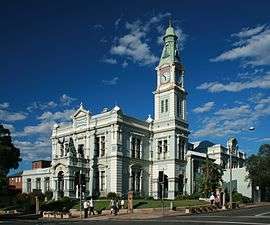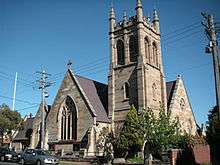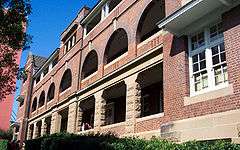Inner West
The Inner West Sydney is an area directly west of the Sydney central business district, New South Wales, Australia. The suburbs of the Inner West are predominantly located along the southern shore of Port Jackson (Parramatta River), stretching south to the shores of the Cooks River. The western boundary is Homebush Bay Drive & Centenary Drive. The Inner West does not exactly correlate to the Inner West local council jurisdiction.
| Inner West Sydney New South Wales | |||||||||||||||
|---|---|---|---|---|---|---|---|---|---|---|---|---|---|---|---|
 | |||||||||||||||
| Population | 293,301 (2016 census)[1] | ||||||||||||||
| LGA(s) | |||||||||||||||
| State electorate(s) | |||||||||||||||
| Federal Division(s) | |||||||||||||||
| |||||||||||||||
Suburbs
Based on the distribution area of the Inner West Courier local newspaper[2] and various Inner West Courier and media articles, the Inner West generally includes the suburbs:
History
Indigenous land
Prior to the arrival of the First Fleet, the Sydney region was home to the Darug people. This nation was broken up into a number of Aboriginal clans who tended to live in a certain geographic area. Each clan contained about 50 to 100 people and, to avoid genetic problems, the men would marry women from other clans. So the clans were interrelated and members from one clan would frequently travel in the territory of others, including to hunt, trade and perform ceremonies. They didn't consider themselves owners of the land, rather custodians.[3]
What is now the Inner West was formerly home to two clans, the Cadigal, whose land stretched along Port Jackson from South Head to Lewisham, and the Wangal, whose land was immediately to the west of the Cadigals and stretched to about Homebush Bay. Other clans that would have been regular visitors to the area would have included the Birrabirragal and Muru-ora-dial in what is now the Eastern Suburbs, the Bediagal and Kameygal from the Cooks River area to the south, the Burramattagal from the Parramatta area to the west, and the Wallumattagal, Cammeraigal and Gorualgal from the northern shores of the Parramatta River.[4]
Geography
The topography of the Inner West reflects rolling hills intersected by shallow valleys through which waterways including Iron Cove Creek, Hawthorne Canal (formerly Long Cove Creek), Whites Creek and Johnstons Creek flow. These waterways have been drastically altered since the late 19th century by the means of concrete lining. In the 1860s iron Cove Creek was a freely flowing waterway which in places broadened into ponds that made excellent and picturesque swimming holes. It is now barely a trickle lined by residential areas, parkland and fast-food restaurants.
Housing
The suburbs within the region are characterised by a wide range of housing, ranging from timber cottages in Leichhardt and Lilyfield to substantial mansions in Stanmore and Strathfield and increasing amounts of medium to high-density housing, particularly along the railway lines. The Inner West includes some of the older constructions in Sydney such as the terraced houses of Glebe, Newtown and Annandale. Balmain has many old stone houses, dating from the mid to late 1800s. Parts of the inner west have been subject to gentrification, particularly in Marrickville, Newtown and its surrounding areas.[5][6]
Schools
It is also the location of several tertiary institutions such as Australian Catholic University, Catholic Institute of Sydney, the University of Sydney, which is reflected in the high student populations amongst the more downtown areas.
The Inner West also features schools such as Sydney Secondary College, Fort Street High School, Burwood Girls High School, Homebush Boys High School, Strathfield Girls High School, Ashfield Boys High School, Presbyterian Ladies' College, Sydney, Meriden School, MLC School, St. Patrick's College, Strathfield, Trinity Grammar School, Newington College and its preparatory school Wyvern House, Santa Sabina College and Rosebank College. The Inner West's two oldest schools are Newington College (established in 1863) and Rosebank College (established in 1867).


Transport
Public transport in the region includes trains, buses, ferries and light rail.[7] Sydney Trains Inner West & Leppington Line runs from Central station, largely running south of Parramatta Road to Strathfield and then to Macarthur via Granville. The Northern Line follows the same route to Strathfield and then branches off to the north to Epping, with stops at North Strathfield, Concord West and Rhodes. The Bankstown Line provides train services to suburbs such as Erskineville, St Peters, Sydenham, Marrickville and Dulwich Hill. There are various bus routes provided largely by State Transit and Transit Systems. Sydney Ferries operates services in the inner harbour and Parramatta river. The Dulwich Hill Line of Sydney's light rail network connects Pyrmont, Glebe, Lilyfield, Leichhardt, Lewisham and Dulwich Hill to Central Parramatta Road runs through the middle of this area. Although still playing only a small part in the overall transport task, use of bicycles for transport has increased significantly in the Inner West since the 1990s. Denser populations and shorter distances mean cycling is often quicker and more convenient than driving or taking public transport. A network of bicycle paths, signed bicycle routes on local streets and other aids to safe and convenient cycling is developing. Main bicycle routes include an East-West route from Five Dock to the Anzac Bridge cycleway, a Northwest route from Gladesville Bridge to Anzac Bridge, a Southwest Route from Marrickville to the City via Newtown. Groups of local bicycle user groups (BUGs) provide help for new cyclists, under the parent banner of Bicycle New South Wales.[8]
Government
In the state parliament, the region is represented by the electoral districts of Balmain, Canterbury, Drummoyne, Newtown, Strathfield and Summer Hill. Following the 2015 state election, these seats were divided amongst the three main parties with Drummoyne represented by the Liberal Party, Canterbury, Strathfield and Summer Hill represented by the Australian Labor Party, and Balmain and Newtown represented by The Greens.[9]
In the federal parliament, the area is represented by the electorate of Grayndler and part of the electorates of Reid, Sydney and Watson (which also encompasses a substantial section of the Canterbury-Bankstown area). Three of these four seats are currently held by the Labor Party, with the seat of Reid represented by the Liberal Party at the 2013 federal election, which won the seat for the first time in 91 years.[10]
Local Government areas
The Inner West is an imprecise geographical region. The Australian Government Bureau of Statistics,[11] the New South Wales Government Department of Planning and Infrastructure,[12] and local media variously describe the Inner West region to include the local government areas of (partly in the case of the last two):
Sport
The Inner West is represented in the National Rugby League by the Wests Tigers, a merger of the Balmain and Western Suburbs clubs. The Region also has another team that represents the region, they're the Canterbury-Bankstown Bulldogs. In the tier below known as the New South Wales Cup, the area is represented by the Newtown Jets and Wests Tigers.
In rugby union, the area is represented by Sydney Uni (the University of Sydney) and West Harbour in the Sydney grade competition. The Inner West also has many semi-professional soccer teams playing in the various divisions of the NSW State Leagues. The most high profile club is NSW Premier League side APIA Leichhardt Tigers.
Religion
In the 2016 Census, the most common responses for religion in the Sydney Inner West were No Religion, 31.7%, Catholic 27.4%, Not stated 9.4%, Anglican 6.9% and Hinduism 5.4%.[13]
References
- Australian Bureau of Statistics (27 June 2017). "Sydney - Inner West (SA4)". 2016 Census QuickStats. Retrieved 15 August 2019.

- "Inner West Courier - Inner West Edition Distribution". NewsLocal (News Corp Australia). Retrieved 11 October 2016.
- Speed the Plough — Ashfield 1788-1988, by Sheena & Robert Coupe, published by Ashfield Municipal Council, 1988 ISBN 0-9595234-1-3
- Archived October 4, 2008, at the Wayback Machine
- Tovey, Josephine. "Bars open, property up: arise the 'new Paddington'". Sydney Morning Herald. Retrieved 15 November 2013.
- Horin, Adele. "Grunge gives way to gentrification in streets of Newtown". Sydney Morning Herald. Retrieved 15 November 2013.
- "Inner West - Sydney City". Retrieved 14 March 2016.
- Home - Bicycle NSW
- "NSW State Election 2011". Elections NSW. Retrieved 16 October 2011.
- Needham, Kirsty (8 September 2013). "Bloodbath in west just did not happen". The Sydney Morning Herald. Retrieved 8 November 2013.
- "1216.0 NSW statistical divisions, subdivisions, local areas". Australian Bureau of Statistics. Retrieved 30 July 2008.
- "Centres and corridors — Inner West" (PDF). NSW Department of Planning. Archived from the original (PDF) on 19 July 2008. Retrieved 30 July 2008.
- "Sydney - Inner West (SA4)". 2016 Census QuickStats. 12 July 2019. Retrieved 18 September 2019.
External links

- Inner West Live - Community Blog by local Inner West people